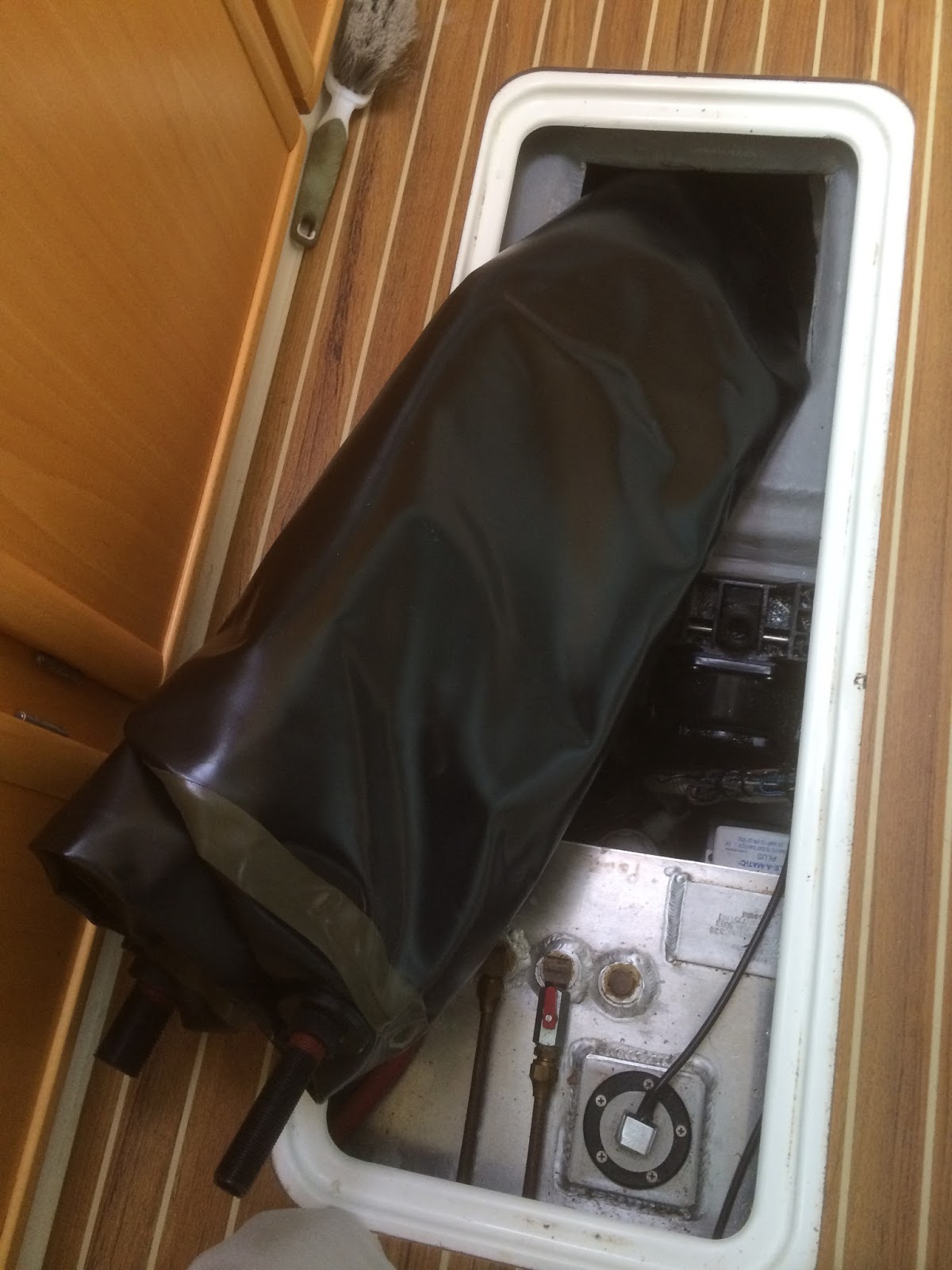A lot of work has gone into our proposed trip to the Louisiades. I thought I would write it down, not because I imagine it will greatly interest the casual reader of this blog, but in case someone else is planning a similar trip and might find it helpful.
I'll organize it into three sections: boat, health and safety.
- Electronics. This was triggered by the lightning strike we suffered in March 2013. Pretty much the whole electrical side of the boat had to be renewed. I have tried to increase our inputs, decrease our outputs, and improve the storage with lithium batteries. We have ended up with 280 usable amp-hours, whereas we previously had 120.
- Watermaker. We have a Spectra Ventura 200T watermaker with extra gadgets. It worked well, and reduced a whole lot of worries about access to clean water in the islands, some of which had been having a drought.
- Solar inputs. An additional two 120 watt solar panels have been added zipped into the canvas sunshades. That gives us 490 watts. There is a new MPPT solar regulator which is a lot more efficient than the previous one, and allows us to charge at up to 36 amps at mid-day in full sun.
- LED TV. The original fitted TV was quite greedy of amps. The new one is an LED Kogan 12 volt one. My impression is that it saves us about 30 amp-hours on a night when we are watching TV or a video.
- Extra diesel. A bladder in the bilge of the port hull carries 100 litres. Two jerry cans in the genset locker. So 320 litres in normal tanks, 140 litres extra. Total 460 litres. We also have a Mr Funnel fuel filter which we used in Misima.
- IsatPhone Pro satphone. The economical mode is SMS, but we can talk direct, and also use it as a modem to pick up GRIB file weather forecasts. With a Mac we use UUPlus for email, and zyGrib as a GRIB viewer.
- Insurance. We had been insured by Nautilus until recently. They managed our claim after the lightning strike pretty well. But when we applied for a quote if we went to PNG the consequences were expensive, and included a $20,000 excess. We got an alternative quote from Topsail, and it came in at half the price, with no excess.
- Travel insurance. We are both in Avant, a medical malpractice insurance scheme. We discovered that an add-on to the normal policy gives us year-round travel insurance very economically.
- Tradeables. The Louisiades are very poor, and few people use cash. To get veggies, crayfish and other things like carvings, you need to carry stuff to trade. Here are some suggestions of things that go down well.
- Fresh fish caught while sailing to the anchorage
- Baby and kids clothes
- Soap
- Small shorts for boys and blokes...they are all slim!
- Shirts and ladies tops
- Hats and caps
- Thongs, crocs, joggers
- Sports gear esp soccer spikes, sox, shorts etc
- Sports bags, backpacks, Hong Kong bags
- Reading and sunglasses
- Baby bottles , powdered milk
- Food : rice, flour, sugar, onions,oil, tea, coffee, biscuits, tinned meat and fish
- Fishing gear: big hooks, line 150lb and much lighter 40 kg, sinkers
- Carving tools , pliers, saws, hand drills and drill bits
- Rope, sail fabric, tarps, sail cloth needles
- Sewing fabric, scissors, needles, cotton, elastic, Singer sewing machine needles
- Solar rechargeable lighting and torches
- Small frypans and saucepans, all kitchenware and utensils
- Batteries
- Exercise books, biros, rubbers, pencils, rulers,
- Health. There are some serious bugs afoot in the tropics, especially ones carried by mozzies, like dengue fever, malaria, and Japanese encephalitis. So we have taken care to get serious mozzie screens over all the windows and doors, including the big trifold doors and the opening windows at the front of the main cabin. Beyond that, we trust the Travel Doctor who specializes in the sort of information one needs for this sort of project. In effect this has included:
- Japanese encephalitis
- Prevenar 13 (pneumococcus)
- Adacel (diptheria, tetanus, pertussis)
- Dukoral (cholera) 2 drinks
- Vivotif (typhoid) 3 capsules on alternate days
- Anti-malarial Malarone (start 2 days before entering malaria zone)
- Hand sanitizer
- Bushmans repellent
- 'Travelling Well', by Deborah Mills. A 'must-have' book.
- A comprehensive First-Aid kit.
- Safety. There is some good advice on the Louisiade Rally site, which includes things like a storm jib, life raft, and doing a safety-at-sea course. We have done all of them.
- Safety experts say you can't use a RIB as a life-raft. I think that one of the plausible disasters to prepare against is getting wrecked on a coral reef. If that were to happen on the windward side, it would worry me to launch a self-inflating kids paddling pool (aka 'Life-raft') which would blow downwind across the coral. Much better to get in the RIB, motor to a safe place, and then hang to a drogue while satphoning for help. To protect against the elements, we have fitted little tubes to the side of the RIB, into which fit tent hoops supporting a heavy duty PVC shelter. We also have a conventional life-raft, the yellow package under the BBQ.
Abandonment gear: full wet weather suit, soft shoes, lifejackets with crotch strap, water activated torch, gloves.
Flares, water, food, V sheet, mirror, torches, sunscreen, reflector, Sat phone, personal EPIRB, hand held VHFs, knife, sunglasses, reading glasses, can opener, first aid kit, seasickness tabs, vomit bag, paper and pencil, batteries, towel, Vaseline, horn, fluoro light sticks, mobile phones.
Passports, credit cards, boat documents: insurance and rego, emergency books, drill sheets, list of last minute things to add.
We found the best anti-nausea pill is Cinnarizine (Stugeron).
























